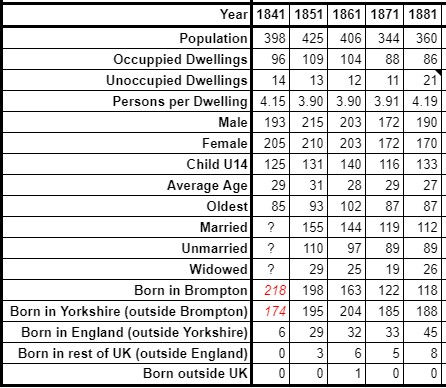1881 - Census Day - One is not amused !!
- Peter Hodgson

- Jan 30, 2021
- 3 min read
3rd April 1881 was Census day in 1881.
Full details are here on the Census page (just scroll down to 1881) where I have put the latest downloadable transcriptions in PDF and CSV format.
We are now towards the later part of Queen Victoria's reign and the year had not started well.
In January, a Fenian dynamite campaign had begun in Britain when a bomb exploded at a military barracks in Salford, Lancashire; killing a young boy. The campaign of bombing would continue through the first half of the decade. Severe blizzards had also occurred over southern parts of Britain - drifts "dozens of feet high were reported and temperatures plummeted to -30 degrees in places. Approximately 100 people died. London was badly affected as well - one was not amused.
Much to Victoria's dismay, her favourite prime minister, Benjamin Disraeli had recently lost the 1880 general election, and Gladstone had returned. Worse still, Disraeli was now very ill and and now lay on what turned out to be his death bed suffering from severe bronchitis (he died on the 19th April - afterwards celebrated as "Primrose Day" after his favourite flower).

Abroad, the First Boer War was being fought in the Transvaal, Southern Africa. . It would see the introduction of the khaki uniform, marking the beginning of the end of the famous Redcoat. The Battle of Laing's Nek would be the last occasion where a British regiment carried its official regimental colours into battle. Gladstone quickly realized that to win the war would mean Britain would have to send far more troops than were available in the region and agreed a truce. It was the first time Britain had to sign an unfavourable truce since the American War of Independence 100 years earlier.
The weekend following the Census Old Carthusians F.C. (formed by former pupils of Charterhouse School) beat Old Etonians (similarly founded by former pupils of Eton) 3–0 in the FA Cup Final at The Oval. It was the last time the Cup Final was played between two amateur sides.
The 14th October became know as "Black Friday" when a severe gale struck the Eastern coast around the Scottish Borders which lead to the Eyemouth Disaster in which over 140 fishermen were drowned at sea. £50,000 pounds was raised by the public to support the families who had lost men (equivalent to about £5 million today).
Treasure Island (or the Mutiny of the Hispaniola) by Robert Louis Stevenson was first serialised in the children's magazine Young Folks from 1881 through 1882.
The year also saw the birth of Alexander Fleming and Pelham Granville "PG" Wodehouse.
1881 was in the middle of what became known as the Great Depression of British Agriculture (ascribed mainly to poor harvests and the massive increase in imported cheap grain). We can perhaps see this biting in the Brompton 1881 census - where although the population has crept up slightly (, the number of unoccupied dwellings has doubled from 1871.

(red numbers are estimated projections)
The impact of the railways and increasing mobility of the population can also be seen when we look at where people were born - with native "Bromptonians" declining and more residents coming from elsewhere in Yorkshire and further afield.

In 1881 the UK total population was just under 3o million, and urbanisation was increasing with more and more people living it towns and cities. Just under 5 million people, 15% or almost one sixth of the UK population, were living in London. This is comparable to now - with a UK population of about 63 million and 9 million of those in London.
.png)



Comments